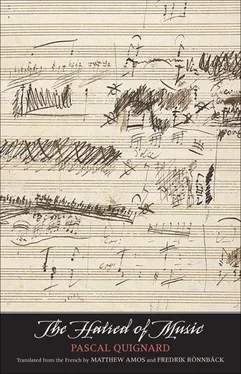Pascal Quignard
The Hatred of Music
First Treatise. THE TEARS OF SAINT PETER
We wrap in cloth an extremely injured and infantile acoustic nudity, which remains without expression deep within us. This cloth is of three kinds: cantatas, sonatas, poems.
That which sings, that which sounds, that which speaks.
With the help of this cloth, just as we try to keep most of the noises of our body from the ears of others, we keep from our own ears certain more ancient sounds and groans.

Mousikè —says a verse by Hesiod — pours small libations of oblivion on sorrow. Sorrow is to the soul in which memories build up what dregs are to the amphora filled with wine. All we can wish for is that they settle. In ancient Greece, the mousa of mousikè was named Erato. She was a prophetess of Pan, the god of panic, traveling in a state of trance under the effect of drink and the consumption of human flesh. Shamans were inspired by animals, priests by immolated humans, bards by the muses. Always victims. Works, however modern they pretend to be, are always more untimely than the times that welcome or reject them. They are always inspired by “panickeas.” 1Panickeas, accompanied by shamanic thyrsi, Pan flutes, and hoarse, mimetic singing, in Latin bacchatio , consisted in putting a young man to death by tearing him apart while still alive and immediately eating him raw. Orpheus is eaten raw. The muse Euterpe brings a flute to her mouth. Aristotle says in his Politics that the mouth and the hands of the muse are occupied exactly like those of a prostitute who, with her lips and fingers, reinflates her client’s physis in order to make it stand below his belly, in such a way that it emits his seed. Works ( opera ) are not made by free men. All that operates is occupied. The “preoccupation” of sorrow. In French souci . 2The deposit in the amphora: the cadaver, the dead that is peculiar to wine.

It was Athena who invented the flute. She fashioned the first flute (in Greek aulos , in Latin tibia ) to imitate the cries she had heard escape the throat of the gold-winged, boar-tusked snakebirds. Their song fascinated, immobilized, and allowed them to kill in the moment of paralyzing terror. The paralyzing terror is the first moment of omophagic panic. Tibia canere: to make the tibia sing.
Marsyas the Silenos pointed out to Athena that, as she imitated the song of the Gorgon by blowing in her tibiae , her mouth was stretched out, her cheeks swollen, her eyes bulging. Marsyas cried out to Athena:
“Put down the flute. Give up that terrifying song and the mask disarranging your jaws.”
But Athena did not listen to him.
One day, in Phrygia, as the goddess was playing on the bank of a river, she caught sight of her reflection in the water. The image of an occupied mouth frightened her. She immediately threw her flute far into the reeds along the bank. She fled.
Then Marsyas picked up the flute the goddess had abandoned.

I am examining the bonds between music and acoustic suffering.

Terror and music. Mousikè and pavor . I find these words to be inextricably linked — however allogenic and anachronistic they may be in relation to each other. Like the sex and the cloth that covers it.

Cloth is used to bandage a gaping wound, to hide a shameful nudity, to wrap the infant coming out of the maternal night and discovering its voice, letting out its first howl, initiating the rhythm peculiar to the “animal” pulmonation that will be its own until death. The old Roman verb solor diverts from our obsessions. It assuages what weighs on the human heart and sweetens the bitterness that eats away at it. It dulls what painfully lurks there and ceaselessly threatens to rise up, to leap out in anguished and feverish panic. That is why we say in French that the muse “amuses” pain. This is the origin of the word consolatio . When the Roman Empire disintegrated province by province, when the social bond and the religio that united the territories were torn asunder only to be reconstructed according to the will of the Christian party and the barbarians who themselves were Christian — at least Aryan — in the early years of the sixth century, a Roman scholar was imprisoned by order of king Theodoric of the Ostrogoths, first at Calvenzano, later in a tower in Pavia. There, the young scholar, the patrician, the Neo-Platonist, the Porphyrian, the Ammonian Boethius, husband to the great-great-granddaughter of Symmachus, husband forever deprived of his wife’s body, composed De Consolatione Philosophiae . Has philosophia ever been much bolder than this solor of the soul? The book was interrupted by the stroke of an axe, one fall day. It was October 23, 524. His name was Anicius Manlius Torquatus Severinus Boethius. Before his decapitation, in the jail in Pavia, the spirit of the world of the dead, the imago , the “consolatory figure” appeared to him in the form of a woman. I quote Prosa I in the first book of the Consolatio: “As I meditated in silence, as I noted down my silent groan on the tablet with my stylus, I sensed that an immense woman had risen above my head, standing very straight, now young, now old. Her eyes were two flames …” The Conservatory. The Consolatory. Joseph Haydn noted, in the small journals/checkbooks he would bring with him on his travels, that he sought to assuage an old acoustic suffering that originated in Rohrau, on the border between Austria and Hungary, and that dated back to the 1730s: the murmur of the Leitha, the wheelwright’s workshop, the illiterate father, the wood used in wheelwrighting, the familiarity with elm, ash, oak, hornbeam, the shafts, the wheels, and the beams, the blacksmith’s anvil, the jolts of the mallets, the saws and their teeth — in a word, all the pathos of the childhood bond rushed forth into his rhythms. He defended himself by composing. Until the months leading up to his death, months during which these rhythms increasingly buried Haydn at a speed that prevented him not only from transforming them into melodies but even from noting them down. Both everything that cannot be translated into language in order to be retained and nothing that can be hailed by language to be expressed and put to death. The unverbalizable. Haydn said that within him were hammer blows as God heard them, nailing his living hands, hammering his joined, living feet, on a stormy day as he found himself fastened to a cross, at the top of a hill.
We sit in a chair. The tears we dry are very old, more ancient than the identity we invent for ourselves. The tears are, like the woman rising up beside Boethius’s bed, “now young, now old.” Between two expressions: “We listen to music,” “We dry tears similar to those of Saint Peter,” I find the latter formulation to be more accurate. A distant farmyard crowing all of a sudden makes a man standing in the corner of a porch break down in tears, in the early days of the month of April, a few minutes before daybreak bleaches all shadows. The crow of a cock that has since been stuck (probably to mark the memory of these enfevered moments that sounds sanction or even announce by triggering them) atop the steeples of churches in the Christian world.
Читать дальше













